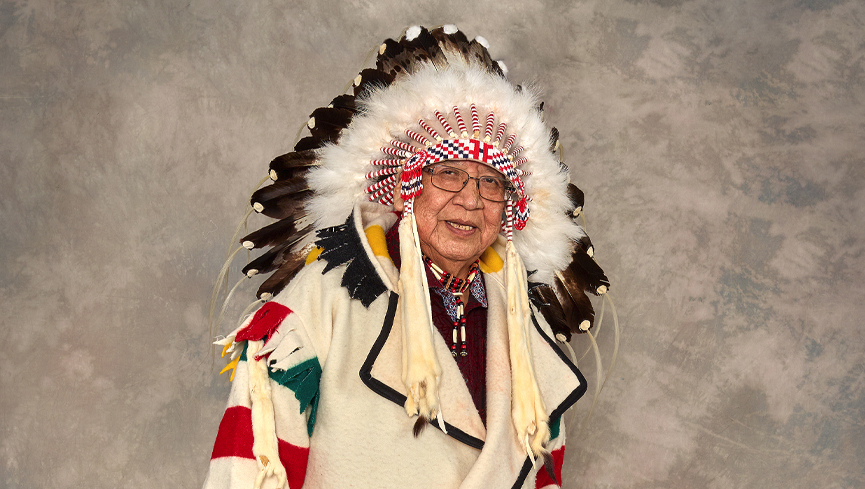The University of Lethbridge (Iniskim) is proud to announce that Elder Ninnaisipistoo (Owl Chief), Francis First Charger, will be awarded an honorary degree at Fall 2024 Convocation ceremonies scheduled for Saturday, Oct. 19.

First Charger has been an Elder in Residence at ULethbridge since 2008 and his advice has been invaluable to staff, students and faculty members. He began his work at the Iniskim with the Dhillon School of Business as an Elder in Residence, providing guidance and support, occasionally giving class lectures, and hosting many visitors. This work has now expanded for all students, staff and faculty members at Iniskim. In addition, he has served on the General Faculties Council as part of their Iniskim Education Committee and is currently a member of the Indigenous Advisory Circle for the Iniskim Governance Process. First Charger also participates in Talking Circles at the Iikaisskini (Low Horn) Student Gathering Centre and advises and supports students, staff and faculty in the Department of Indigenous Studies and other departments as needed. His presence and guidance help students feel welcome and give them a safe space to grow as people and develop their curiosity, knowledge and skills.
“Many years ago, a ‘spark’ manifested somewhere on Blood Reserve in southern Alberta. That ‘spark’ continued to shine for a number of years almost unnoticed,” says Dr. Leroy Little Bear (BASc (BA) ’72, DASc ’04). “But suddenly that ‘spark’ manifested as a source of knowledge, wisdom and service. That ‘spark’ is ‘Ninnaisipistoo’ (Francis First Charger). Francis continues to be a spark of knowledge and service to his community and Iniskim University of Lethbridge in many different capacities. The awarding of an honorary degree ensures that the ‘spark’ will never die out and will always be remembered.”
“The contributions that Francis has made to ULethbridge are innumerable and we are extremely pleased to award him an honorary degree,” says ULethbridge Chancellor Terry Whitehead (BA ’94). “He played a key role in helping the University acquire its ceremonial pipe, commissioning Jerry Potts from the Piikani Nation to handcraft the pipe. Furthermore, his knowledge of Blackfoot culture and Indigenous ways of knowing, coupled with his broad experience in business, have benefited many people and organizations in southern Alberta.”
The University of Lethbridge will present Francis First Charger with an honorary Doctor of Laws, honoris causa, at 10 a.m. on Saturday, Oct. 19.
Francis First Charger
First Charger was raised following Blackfoot culture and ceremonies, and traditional Blackfoot values have guided his life. He brought many skills with him when he became an Elder in Residence. He was instrumental in initiating the process for the University to acquire its ceremonial pipe, commissioning Jerry Potts from the Piikani Nation to handcraft the pipe.
In addition to his knowledge of Blackfoot culture and Indigenous ways of knowing, he brought a broad base of experience in business management, administration and accounting after working at Red Crow Community College and the Blood Tribe Agricultural Project (BTAP). He was one of the key figures in coordinating the export of Timothy hay to Pacific Rim countries for BTAP. At Red Crow College, First Charger was involved in a visit to Guatemala for possible academic work. Beyond the Kainai First Nation, First Charger has lent his expertise and time to many local organizations, including Lethbridge Polytechnic, the City of Lethbridge, Community Futures Treaty 7, Opokaa’sin Early Intervention Society and the First Nation Forestry program.
First Charger was approved for the role of Elder in the Independent Assessment Process (IAP), the system used to determine eligibility for damages and quantum of damages for abuse suffered by claimants under the Residential Schools Class Action lawsuit against the Government of Canada and the churches that ran the schools. Claimants could choose if they wanted an Elder present to support them through the hearing process. First Charger played that role in numerous hearings, providing spiritual ceremonies before the hearings and support throughout the hearing process. Many claimants asked First Charger to be present for their testimony, as his presence provided comfort and strength as they spoke about the atrocities they suffered and the impacts on their lives. He was also a qualified Blackfoot interpreter in many IAP hearings. First Charger was widely praised by lawyers and adjudicators involved in the IAP because he could be relied upon to provide compassionate, kind and respectful support to claimants going through this difficult process.
